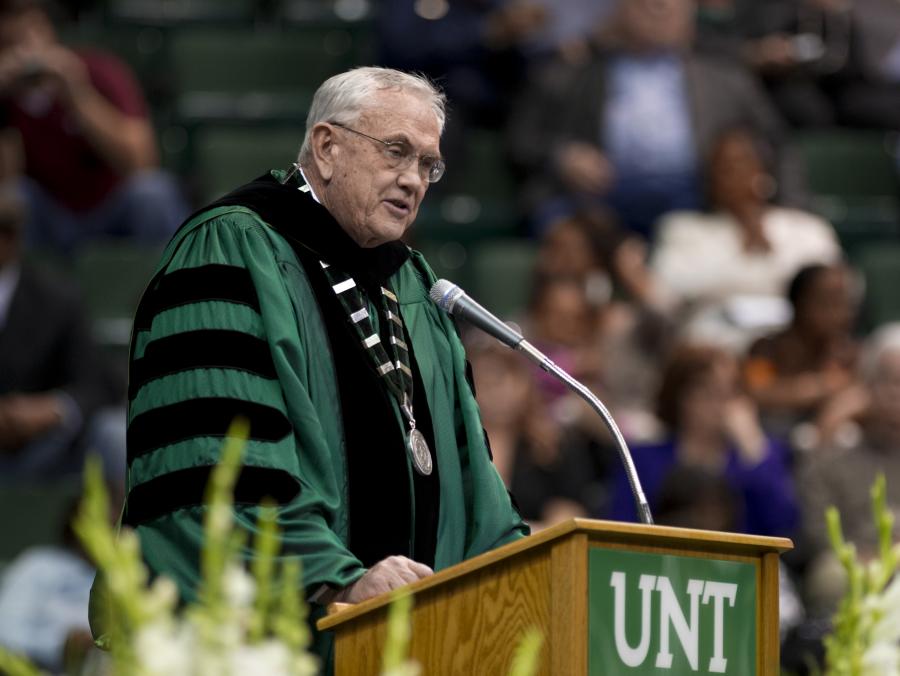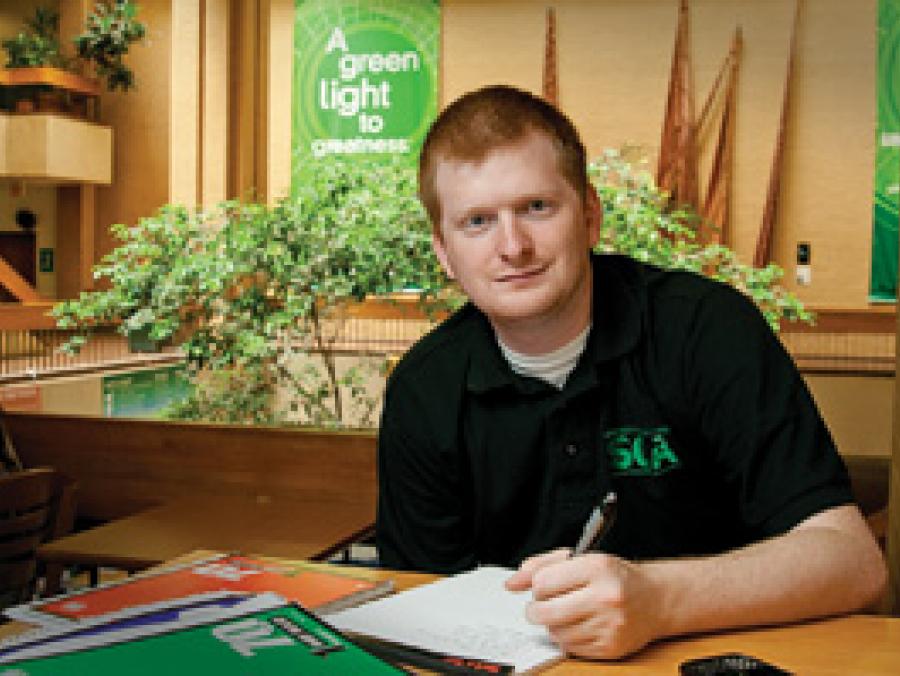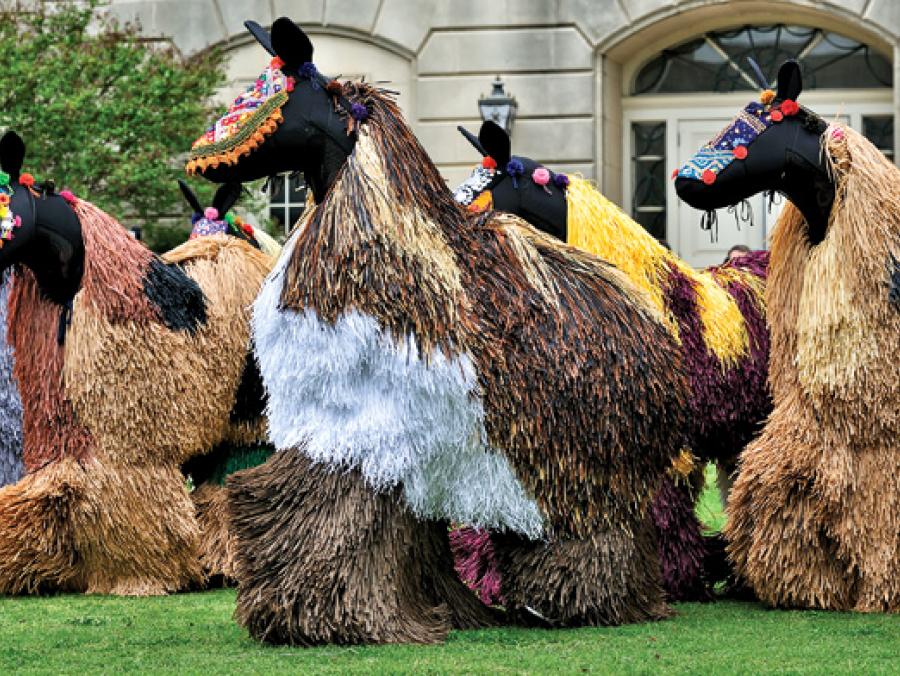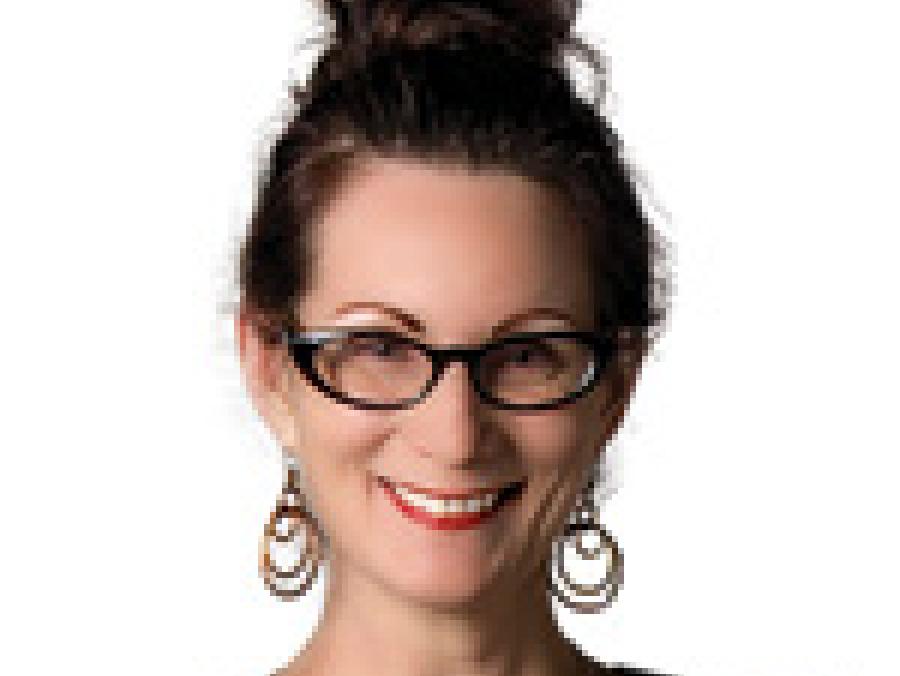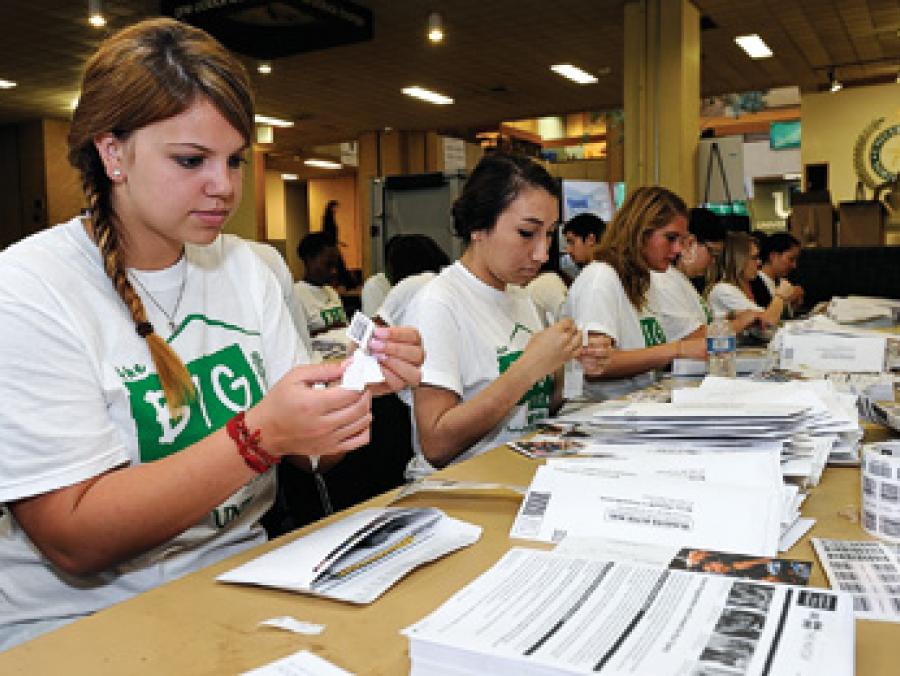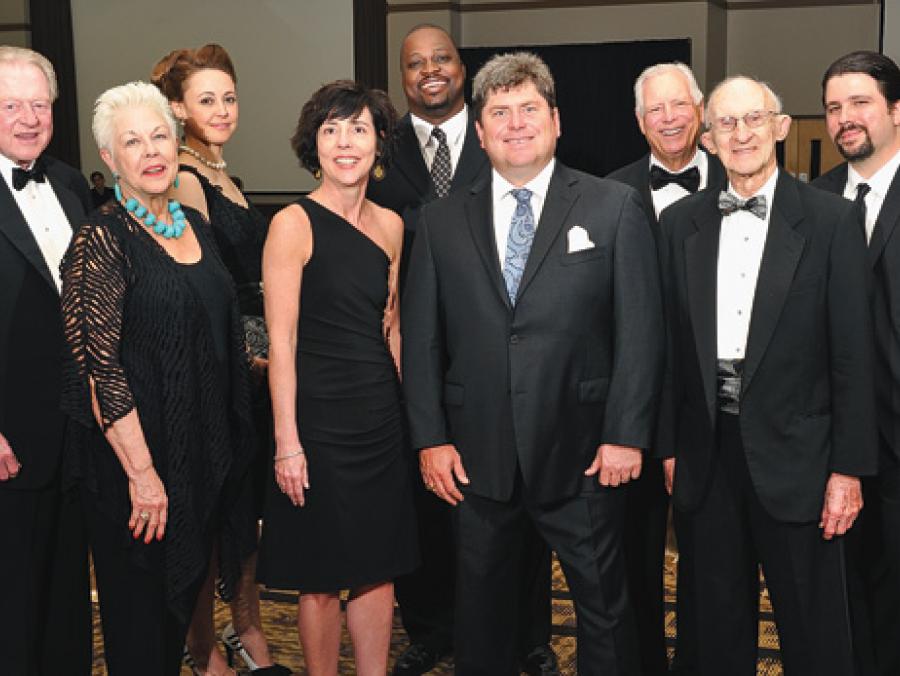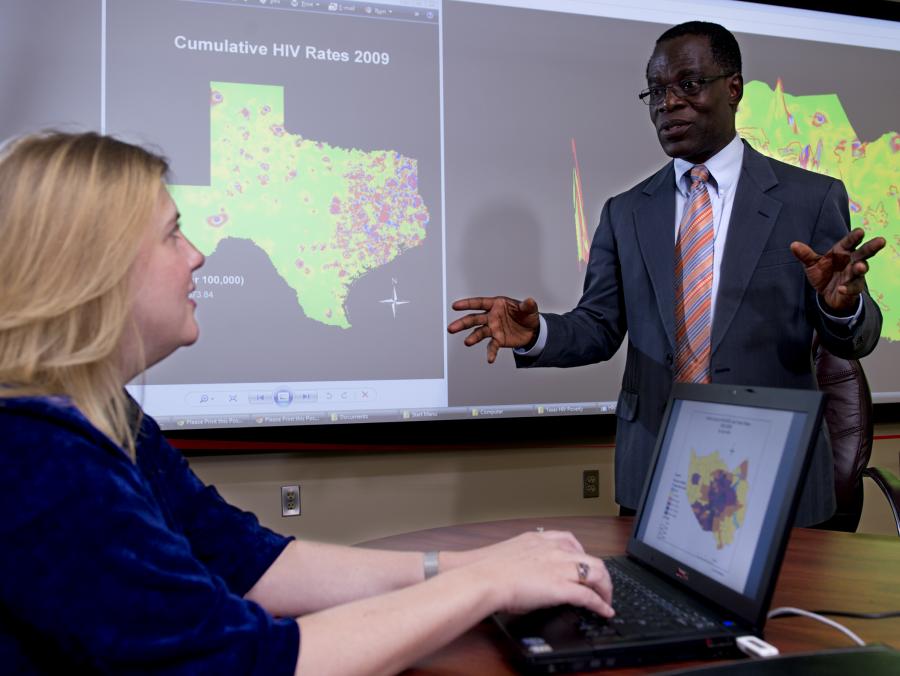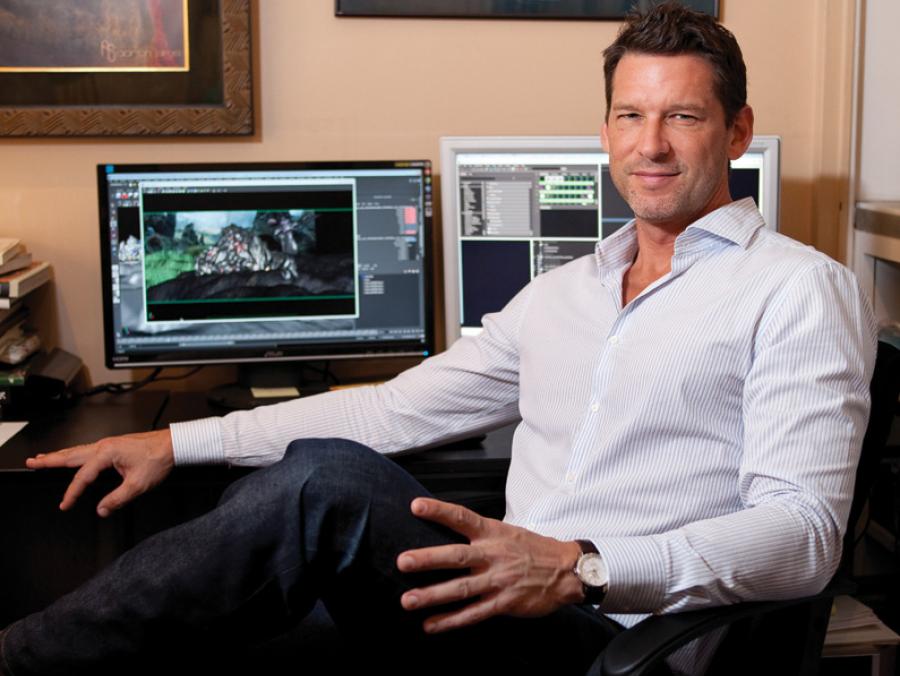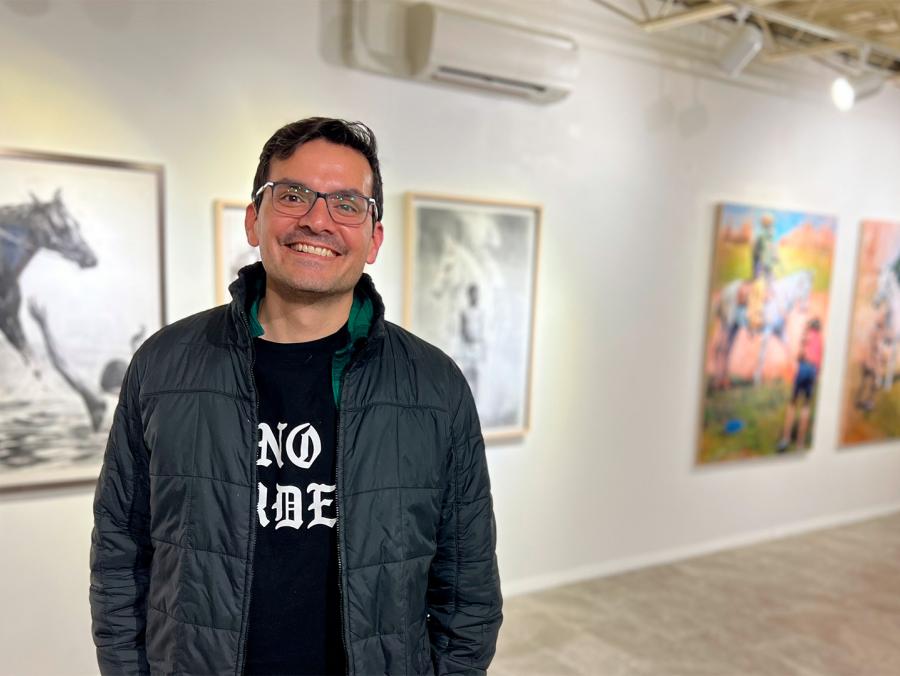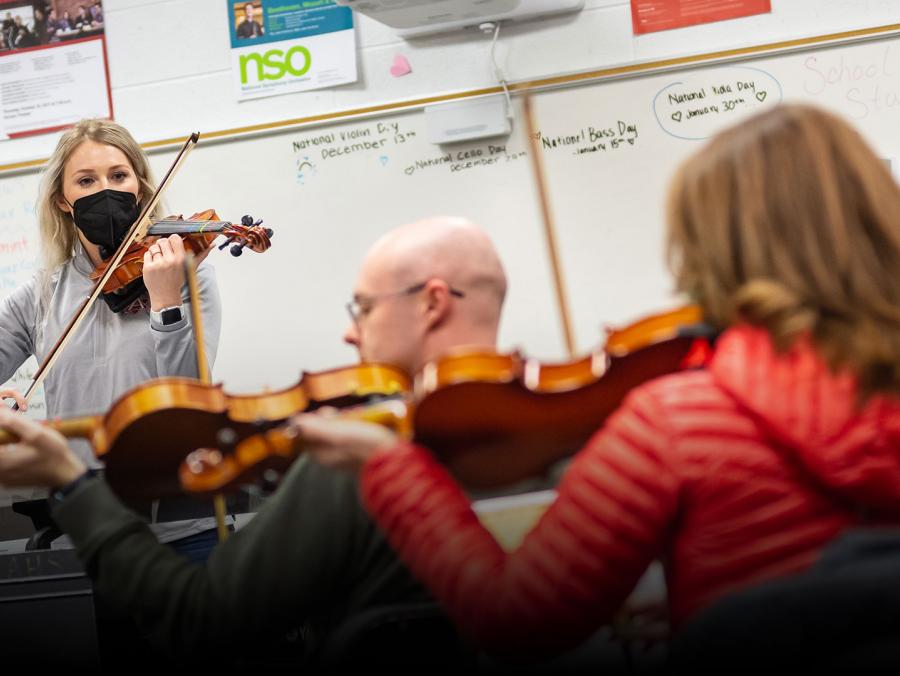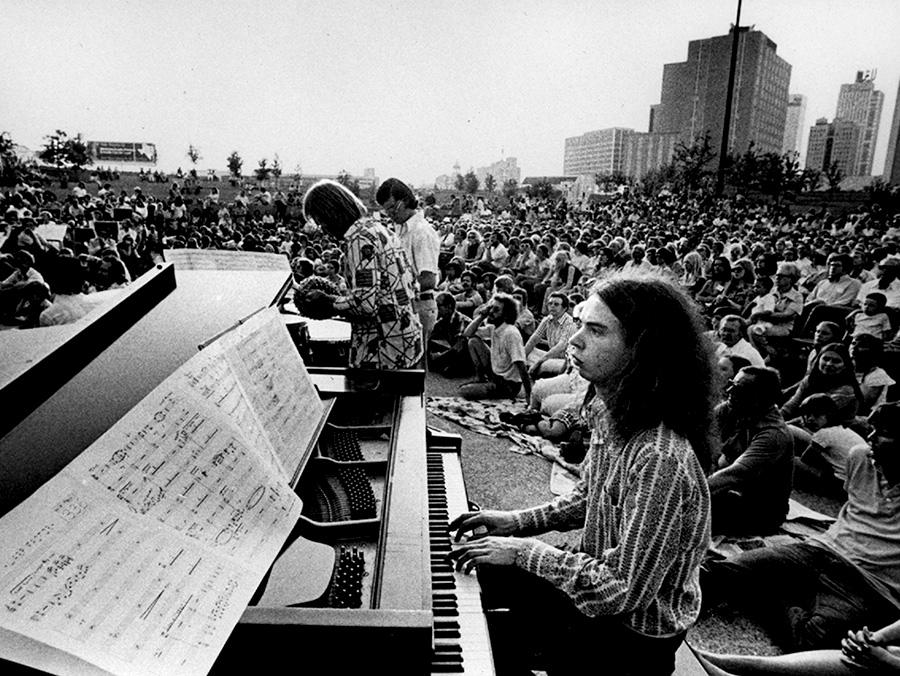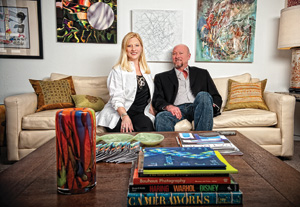 When he looks for art to fill his gallery in Dallas, Cohn Drennan (’86 M.F.A.) starts with UNT.
When he looks for art to fill his gallery in Dallas, Cohn Drennan (’86 M.F.A.) starts with UNT.
But he’s not the only one. There’s competition.
"I always have an open door for UNT students. But there are a lot of people here in town who also want to show and work with UNT students," says Drennan, owner of Cohn Drennan Contemporary, and he attributes that to UNT’s powerful reputation in the arts. "UNT has been doing it better and longer than anybody else. Everybody else is playing catch-up."
From Dallas to Fort Worth as well as far beyond, people with UNT ties are fueling the region with their creative energy. They’re running galleries and museums, leading dance troupes, spearheading high-profile musical performances and festivals, and managing theatre companies. They are among the more than 216,000 alumni who live in the Dallas-Fort Worth area, contributing to one of the nation’s largest economies. And because Denton is home to the university and has an advantageous location near Dallas and Fort Worth, it is a leader in shaping the cultural face of the region.
UNT has long been known as an incubator of creativity. After all, the university is home to an internationally acclaimed College of Music that offered the nation’s first jazz degree, and the College of Visual Arts and Design is one of the nation’s most comprehensive visual arts schools at a public university. It’s considered one of the best arts schools in the South and Southwest.
Close to the Denton campus on the city’s historic square, UNT on the Square is the home of UNT’s Institute for the Advancement of the Arts, opening its doors for exhibitions, concerts and receptions. Denton also fills its city parks, clubs and streets with numerous music and art festivals each year, drawing on the talents of UNT faculty, students and alumni. Take 35 Denton, which highlights the city’s internationally recognized indie rock music scene, bringing in hundreds of bands, and the Denton Arts & Jazz Festival, which attracts more than 200,000 visitors from across the state and nation. And, in the heart of downtown Dallas, the university opened a Design Research Center, which is a classroom and laboratory space supporting faculty and student research efforts, but also a partner with the community. UNT talent — from music to the arts and theatre — permeates public places in Denton and beyond, and helps attract businesses.
"Urban researchers have recently uncovered that thriving economies are based on the presence of a strong creative class, and a strong creative class only thrives in a region of strong, local culture," says Robert Milnes, dean of the College of Visual Arts and Design. "You can’t import that culture. It has to be grown locally and evident in the streets, schools and businesses. It’s about the myriad small design firms, galleries, shops, coffee houses, bars, clubs and other venues where creativity is grown, shown, heard, debated and developed."
The business of art
Drennan and his wife, Catherine, dreamed of opening a gallery in Dallas’ Deep Ellum when Drennan was earning his master’s degree in photography in 1986 and Catherine was taking design classes.
"By the time the semester ended, the real estate market had just collapsed, and the last thing people spend money on during a recession like that is art," Drennan says.
He and his wife moved to Washington, D.C., where he worked as deputy director of the U.S. Department of State Art in the Embassies Program from 1989 to 2005. There, he supervised the management of art works on loan to U.S. embassies from around the world. He then served as the director of the Wichita Falls Museum of Art at Midwestern State University from 2005 to 2010.
After that, he and his wife opened Cohn Drennan Contemporary in Dallas. Graduate students Michael Blair and Blayre Stiller recently exhibited their work in a Master of Fine Arts thesis exhibition at the gallery. The Drennans also bring artists from the East Coast and overseas to the DFW area, partnering them with mid-career or younger artists to show their work side by side.
Drennan credits his studies at UNT — including three years as a teaching fellow — with helping him gain the experience to run a business.
"The faculty set us up so that we could help them with the department and its operation," Drennan says. "They were able to provide us with professionalism, tools and responsibilities you would need in any business, but in this case, it was focused on the art department — teaching classes, managing labs and overseeing inventories.
"I have always told everybody I would never trade the time I was at UNT," Drennan says. "Just having those years to focus and study without distraction changed my life."
Organizing talent
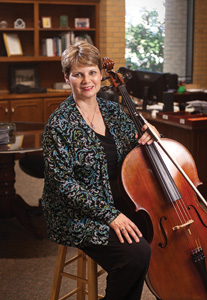 Debbie Brooks (’77, ’81 M.M.), director of DFW Musicians Services, has contracted orchestras for big-name stars Luciano Pavarotti, Diana Ross, Rod Stewart and more. She schedules hundreds of events a year, booking musical groups for everyone from celebrities to brides and charities and sending musicians across the region, state and nation.
Debbie Brooks (’77, ’81 M.M.), director of DFW Musicians Services, has contracted orchestras for big-name stars Luciano Pavarotti, Diana Ross, Rod Stewart and more. She schedules hundreds of events a year, booking musical groups for everyone from celebrities to brides and charities and sending musicians across the region, state and nation.
Her own freelancing career as a cellist began in her first year at UNT, when she drove with a friend to Dallas for church gigs. On campus, she performed under the baton of then-new Symphony Orchestra conductor Anshel Brusilow, a former concertmaster of the Philadelphia Orchestra and former conductor of the Dallas Symphony Orchestra.
"My freshman year was his first year on campus. We were like rock stars," says Brooks, whose musical training began in the piano studio of her father, James Petty (’55). "Everyone came to hear the orchestra."
Under the guidance of well-known cello professor Adolfo Odnoposoff, she mastered volumes of cello repertoire.
Just after graduating, Brooks won a position with the Fort Worth Symphony Orchestra. She stepped down from her seat as the orchestra’s associate principal cellist in 1999, looking for a new challenge. She helped organize a 77-piece orchestra for Italian tenor Andrea Bocelli and the experience, along with her UNT roots, inspired her to begin DFW Musicians Services.
Brooks still performs as a freelance cellist with the Fort Worth Symphony, Dallas Symphony and Dallas Summer Musicals and offers private lessons to a select group of students.
Through her business, she is constantly in touch with professors, looking for UNT student talent to fill her groups. She treats them just as she treats any seasoned performer and encourages them to join the professional musician’s union, she says.
"If they are good enough to be on my job, they are good enough to get paid like a professional," she says.
Nurturing environment
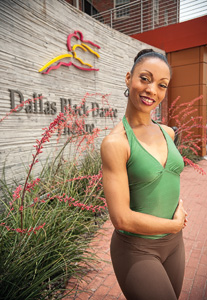 By age 11, Katricia Eaglin (’03) already had danced for royalty.
By age 11, Katricia Eaglin (’03) already had danced for royalty.
She started learning folklorico Mexican dance in elementary school and later added West African dance to her repertoire, performing for the king of Ghana. She began her formal modern dance and ballet training at Booker T. Washington High School for the Performing Arts in Dallas.
But it was at UNT that Eaglin polished her entrepreneurial skills, studying dance with a minor in business. She created the Freedom Dance Ensemble, a student group that performed at weddings and museum receptions, among other events.
"UNT was a nurturing environment for me as a dancer and as a person," Eaglin says, recalling the help of dance faculty members Mary Lynn Babcock and Arleen Sugano. "They guided me as a dancer and said if you can change it, then work on it, and accept the things you can’t change. I had never experienced that type of acceptance."
Eaglin had set her sights on becoming a member of the Dallas Black Dance Theatre while watching a performance at age 14. She auditioned four times — including during her studies at UNT — before earning her coveted spot in the company in 2005.
"It wasn’t a seat or a throne," she says. "I didn’t get in the company and get to sit down. I would come in and dance six hours straight. I was drained, learning all of these techniques and choreography, but it was an overwhelmingly great experience."
In addition to dancing in the company, Eaglin serves as assistant rehearsal director, teaching choreography and reconstructing dances. She also tours with the company — including recent performances in Belize and Canada. These days, people around DFW are taking note of her triumphs, evidenced when D Magazine named her in its special report on black achievers in 2011.
"UNT had a great impact on me — and not just my teachers in the dance department," she says, remembering the start of the Freedom Dance Ensemble. "UNT fostered that entrepreneurial mentality in me."
Creative energy
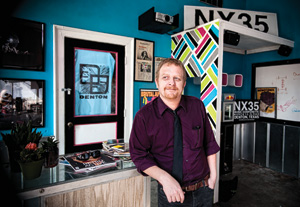 Singer and songwriter Chris Flemmons couldn’t stand to be away from Denton for too long. He grew up in Fort Worth but studied film at UNT in the late 1980s and early 1990s until he found steady work in film production. Flemmons moved to Dallas for a couple of years but missed the culture of his university town.
Singer and songwriter Chris Flemmons couldn’t stand to be away from Denton for too long. He grew up in Fort Worth but studied film at UNT in the late 1980s and early 1990s until he found steady work in film production. Flemmons moved to Dallas for a couple of years but missed the culture of his university town.
"This place is just oozing with creative energy," he says.
He returned and established a band, The Baptist Generals, which got its start on Denton’s Fry Street and eventually signed with Sub Pop — "the label that brought Nirvana into the world," he says.
In the meantime, Flemmons crafted a plan for 35 Denton — originally called NX35 Music Conferette — a walkable music festival to highlight the indie music scene and boost the Denton economy.
"Denton is unique. Plano, Frisco or Coppell couldn’t build what’s here culturally with music," Flemmons says. "It was seeded by the university, but it exists on its own now. We have something that I felt needed to be built upon, and I wanted the conferette to be something that would draw national and international attention to Denton."
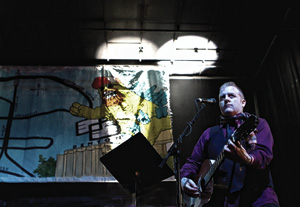 The New York Times took note of the "indie scene that comes with a Texas twang" in a 2008 story, calling Flemmons one of the "elder statesmen of sorts of Denton’s music scene." The city’s festivals span blues, Latin and jazz music, and the indie scene grew with the Fry Street Fair, a block from campus, in the 1970s.
The New York Times took note of the "indie scene that comes with a Texas twang" in a 2008 story, calling Flemmons one of the "elder statesmen of sorts of Denton’s music scene." The city’s festivals span blues, Latin and jazz music, and the indie scene grew with the Fry Street Fair, a block from campus, in the 1970s.
"It used to be we’d get so excited when we’d pick up some marginal music publication that was printed nationally and read a review of a band from Denton, and now it’s just a regular occurrence," Flemmons says.
Some have asked if the festival is trying to compete with the popular SXSW in Austin, but Flemmons calls SXSW "a different animal."
"The contrast that we were trying to strike between the behemoth that is SXSW and this is we wanted it to be a walkable festival," Flemmons says. "SXSW was the grandfather."
Since the festival started, Flemmons has seen more businesses pop up. Oak Street Drafthouse, Mad World Records and the Denton version of the Love Shack, which has two locations in Fort Worth, are a few, he says.
Community impact
Mike Barrow knows the flavor of Denton is unlike any other.
"There is something special about Denton that is different than your typical Texas atmosphere," Barrow says from his office as managing director of Denton Community Theatre, overlooking Denton’s Hickory Street.
"It’s always broken out of the norms. We support art and make it a huge part of what we do, and that starts with a university. Students who go to UNT naturally come away with an appreciation of the artistic part of the university because it’s everywhere."
Barrow began his theatrical career at age 10 — as a baseball player in Denton Community Theatre’s production of The Remarkable Mr. Pennypacker. His parents, former North Texas students Frank and Betty Ann Barrow, are credited with being among the founders of the community theatre, more than 40 years ago. Today, Denton Community Theatre is the managing group of Denton’s historic Campus Theatre owned by the Greater Denton Arts Council. Barrow practically grew up on campus, helping his parents at The Varsity Shop, a clothing store they owned on Avenue A, and studied theatre at UNT.
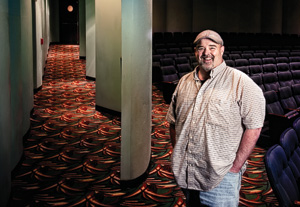 He also focused his creative energy on playing in a band he started with Lambda Chi fraternity brothers Mike and Joe Clay (’83) (also real-life brothers) and Keith Reynolds.
He also focused his creative energy on playing in a band he started with Lambda Chi fraternity brothers Mike and Joe Clay (’83) (also real-life brothers) and Keith Reynolds.
When he was invited to interview for the Denton Community Theatre managing director’s job, Barrow says his experience from helping to run family businesses and his theatrical training meshed. Now, he manages the budgets for the nonprofit educational organization, which mounts up to 10 productions a year, participates in traveling and competition shows and offers theatre classes.
He’s also renewed the organization’s spirit of volunteering. Fundraisers and monthly outreach programs pull community members together to share their theatre skills, such as vocal training and set production.
"We have a lot of talented artists, and that’s what brings people to Denton," he says. "People come from all over the North Texas region to see the shows."
Many of the actors also perform regularly at community theatres across the Dallas-Fort Worth area, including the Greater Lewisville Community Theatre, Runway Theatre in Grapevine, Irving Community Theatre and more.
Cultural breeding ground
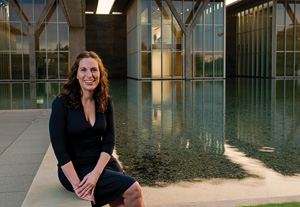 Fresh out of college, Andrea Karnes (’88) landed a job at the Modern Museum of Art in Fort Worth as a receptionist, where she learned about curating from the ground up.
Fresh out of college, Andrea Karnes (’88) landed a job at the Modern Museum of Art in Fort Worth as a receptionist, where she learned about curating from the ground up.
"Being a receptionist was kind of like being an intern for everyone at the museum because support staff was limited then," she says.
Karnes worked her way through the ranks and attended graduate school at the same time, serving as research assistant, registrar, assistant curator, associate curator and, currently, curator at the Modern. The museum has featured alumni such as Jeff Elrod (’90), a painter who had a solo exhibition organized by Karnes in 2009, and Erick Swenson (’99), a sculptor, who has work in the Modern's permanent collection and whose work is being exhibited by the Nasher Sculpture Center in Dallas.
"I like working in the field of contemporary art, where volumes of scholarship aren’t already written," she says. "If you are looking at very young artists still emerging in their careers, which is part of what I do, it’s like jumping off a high dive — being at the beginning of an exciting and new contribution to the art world."
As curator, Karnes conceives the idea for the exhibitions she organizes, and she works with artists, galleries and collectors to obtain the artwork on loan in order to put the shows together — a process that can take from one to several years.
"When I was at UNT, it was an experimental time for all kinds of events — exhibitions, music, art happenings," she says. "It was an extremely influential time for me. It really was a cultural breeding ground."
Professors armed students with tools and language to be critical of themselves and their classmates in a learning environment, says Karnes, who studied art history.
"You had to be honest about what you were evaluating, and that’s part of my job now," she says. "A lot of that came from those fundamentals I learned as an undergrad in critiques."
She and her UNT friends took in new musical acts at The Library and ventured across the state to see gallery exhibitions of fellow students. Every year, they’d visit the annual Voertman Student Art Competition — still an important part of today’s student experience — to read the professional juror’s statement and try to determine why certain pieces were selected.
"It provided me with a level of comfort in being around a host of things that weren’t necessarily culturally mainstream and gave me the chance to go to galleries, museums and unconventional music venues," Karnes says. "That happened in Denton, Texas, but it somehow prepared me for the rest of the world."



